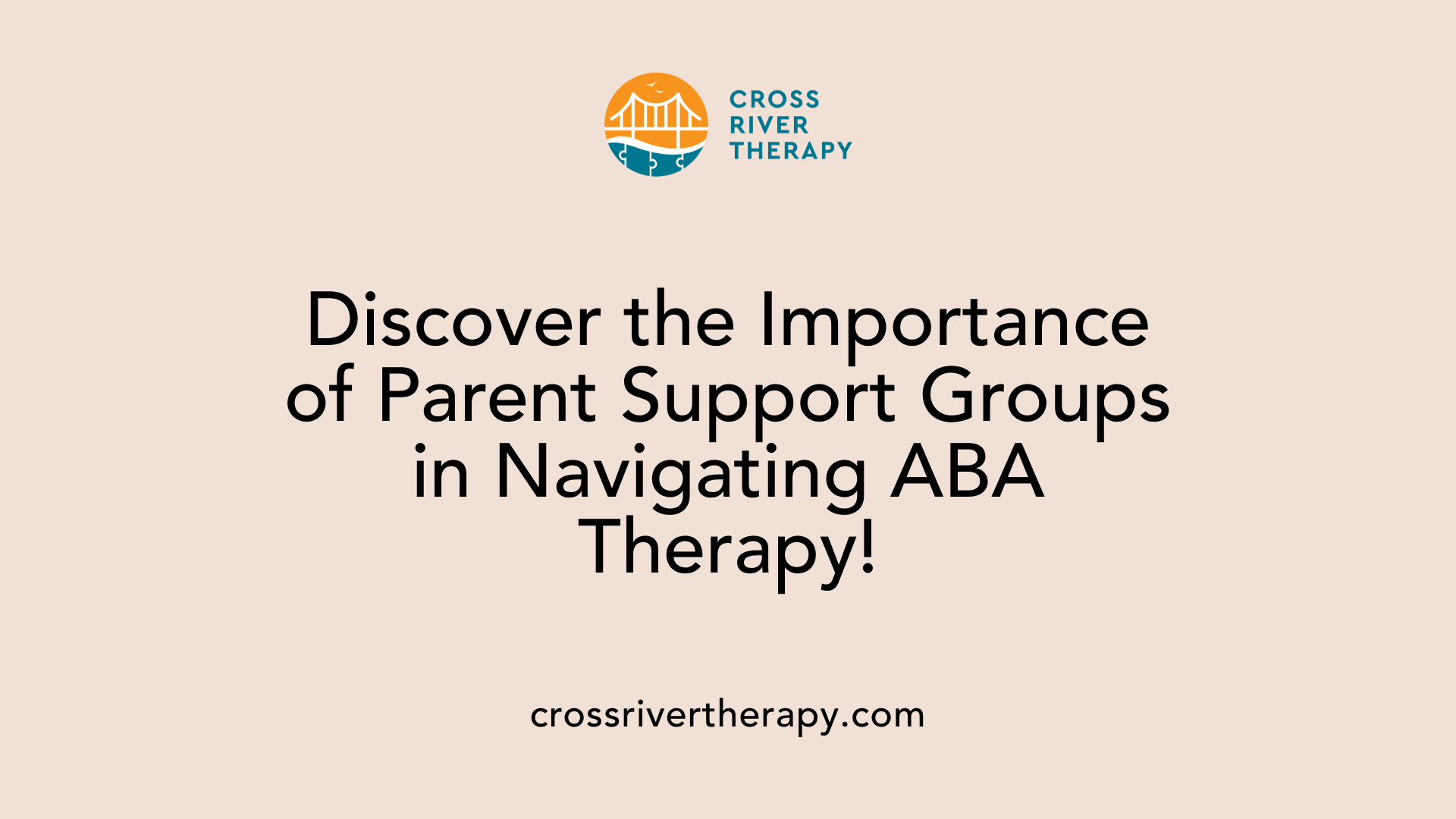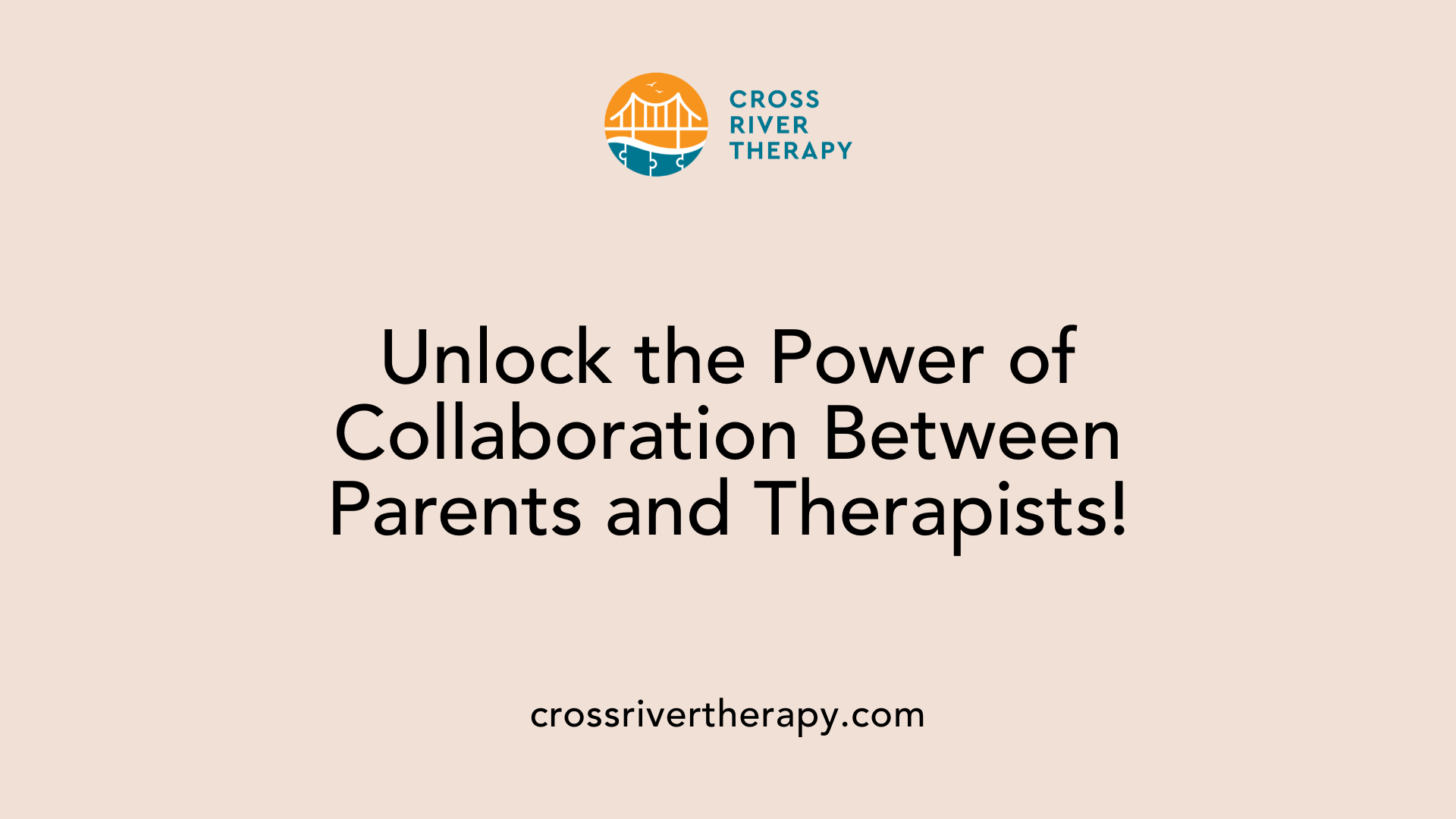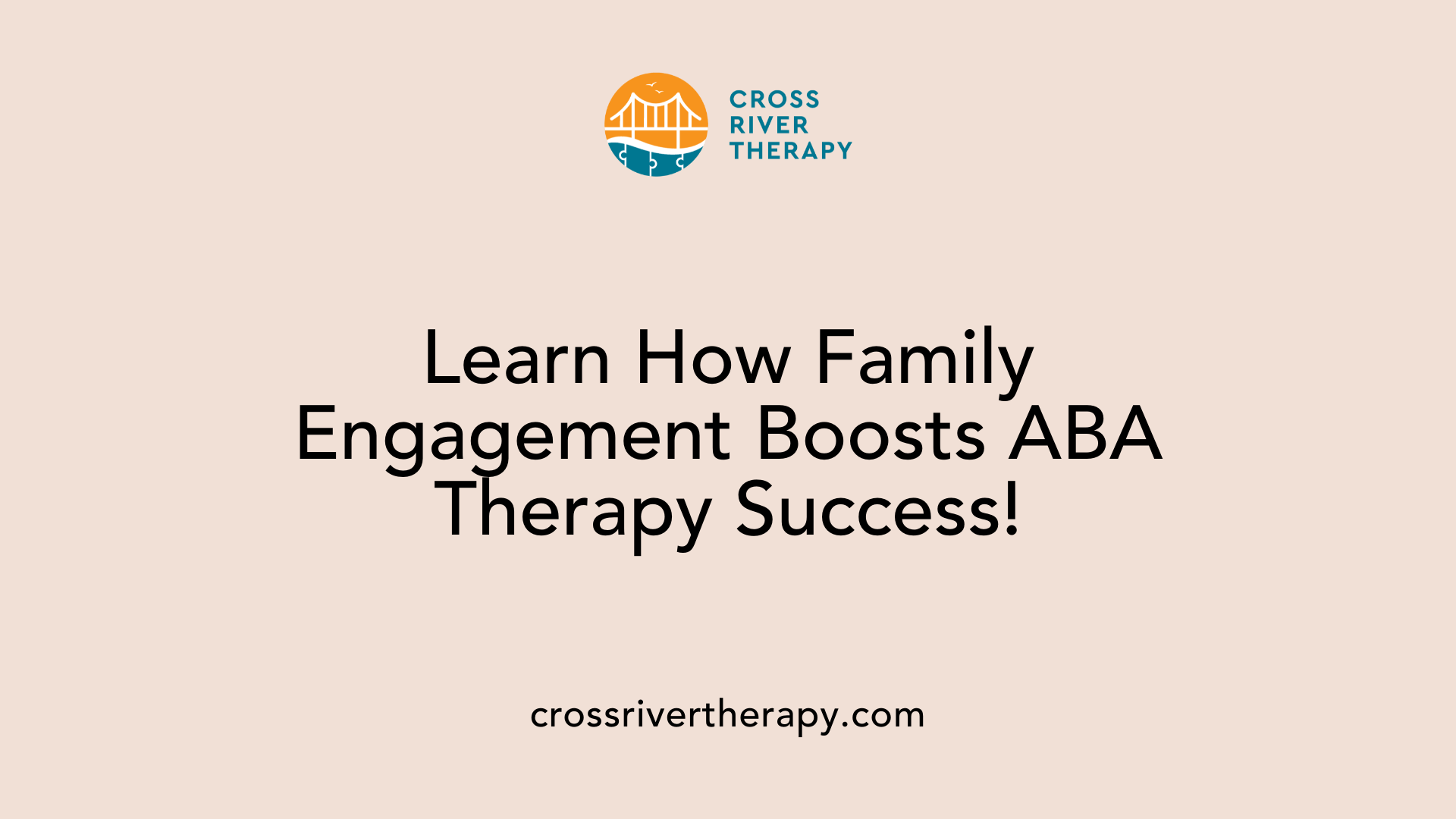Why ABA Therapy Centers Include Parent Support Groups
The Integral Role of Parent Support in ABA Therapy
Understanding ABA Therapy and Parent Support Dynamics
Applied Behavior Analysis (ABA) therapy is a cornerstone in the treatment and support of children with autism. Central to its success is the active involvement of parents, not only in the direct application of therapeutic practices but also in the communal sharing of experiences and strategies through parent support groups. These groups are pivotal, offering more than companionship—they provide a framework for overcoming the multifaceted challenges autism presents.
The Essential Nature of Parent Support Groups in ABA Therapy

Why are parent support groups important in ABA therapy for children with autism?
Parent support groups hold significant value in the ABA therapy landscape for children with autism. They create a platform that provides essential guidance and advocacy, empowering families as they navigate complex systems such as education and mental health services. Through these groups, parents can gain insights into effective strategies, share resources, and learn from one another's experiences, fostering a sense of community.
In these groups, parents experience a reduction of feelings of isolation, as they connect with others facing similar challenges. This camaraderie not only offers emotional support but also instills hope through shared journeys of growth and resilience.
Collaboration with treatment professionals is another crucial aspect enhanced by parent support groups. Parents become better equipped to communicate their children's needs, leading to effective advocacy within educational and community contexts. Such interactions often result in increased self-efficacy among parents, as they feel more confident in participating actively in their child’s therapy, thereby improving the overall effectiveness of interventions.
The Role of Parent Involvement in Therapy
Active parental involvement is integral in maximizing the benefits of ABA therapy. Parents reinforce strategies at home, ensuring consistency that is key to the generalization of skills learned in therapy. Furthermore, by attending therapy sessions, parents can learn direct techniques to support their child's growth and behavior management effectively.
Guidance and Advocacy Through Support Groups
Support groups not only provide a safe space for parents to vent and share their feelings but also facilitate learning and empowerment. They help parents understand ABA principles, which enhance their ability to advocate for appropriate services and interventions. This overarching support system significantly contributes to the well-being and empowerment of families managing the intricacies of autism-related challenges.
Amplifying Therapy Outcomes Through Parent Involvement
What are the benefits of parent involvement in ABA therapy for children with autism?
Parent involvement in ABA therapy is foundational for ensuring that children achieve the best possible outcomes. When parents actively participate, the therapy's effectiveness is notably enhanced. This engagement allows parents to be directly involved in important aspects like goal setting, program implementation, and ongoing assessment of their child's progress.
Organizations that adopt a family-centered treatment model, such as Autism Learning Partners, emphasize collaboration between parents and therapists. This includes parent training sessions that equip caregivers with essential strategies to support their child's learning in everyday situations, effectively promoting skill generalization.
Furthermore, parents receive hands-on coaching to manage challenging behaviors, ensuring they can reinforce the techniques learned during therapy. Research has shown that children demonstrate significant progress when their parents are engaged. This involvement not only aids in behavioral and communication skill development but also fosters a supportive environment that contributes to the child’s overall success.
How does collaboration with therapists amplify therapy outcomes?
Collaboration between parents and ABA therapists is vital for the success of the intervention. Regular communication helps parents stay informed about their child's progress and adapt strategies accordingly. By building strong relationships with therapists, parents can align goals and modify therapy approaches as needed, tailoring interventions to better meet each child's unique requirements.
This synergy creates a consistent support system that benefits the child during therapy and in real-life situations, reinforcing skills learned in sessions. Overall, a unified approach, where parents and therapists work together, leads to improved outcomes and a more effective therapeutic experience for children with autism.
Table: Key Elements of Parent Involvement in ABA Therapy
| Element | Description | Benefits |
|---|---|---|
| Parent Training | Caregivers learn strategies for home reinforcement | Equips them to support skill generalization |
| Collaborative Goal Setting | Engages parents in defining therapy objectives | Ensures alignment with family priorities |
| Regular Communication | Consistent updates on progress from therapists | Builds trust and allows for timely adjustments |
| Emotional Support | Parents gain validation and understanding through support groups | Foster resilience among families |
Navigating Autism Challenges: The Role of Support Networks
How do parent support groups assist families navigating challenges related to autism?
Parent support groups play a vital role for families facing the complexities of autism. They establish a community where parents can share experiences and resources, significantly alleviating feelings of isolation. In fact, a study revealed that 66.4% of caregivers participated in such groups, often seeking help during particularly challenging times like dealing with self-injurious behaviors or severe language deficits.
Barriers to support group participation
Despite their benefits, participation rates in support groups can be uneven. Many caregivers are not referred by clinicians; in the same study, only 24.8% received such recommendations. Additionally, these groups often attract predominantly white individuals with higher education and incomes, highlighting potential barriers for underrepresented families who may find it harder to access these resources.
Alleviating isolation and empowering parents
Support groups provide more than just emotional backing; they help enhance knowledge about autism care. By sharing insights and discussing strategies, parents become more empowered advocates for their children’s needs. This collaboration not only fosters a sense of belonging but also equips families with practical tools for navigating everyday challenges, ultimately leading to improved outcomes in their children’s lives.
Facilitating Collaboration Between Parents and Therapists

Communication and collaboration
Collaboration between parents and therapists is a cornerstone of effective ABA therapy. This partnership allows parents to better understand their child's progress and the strategies used during therapy sessions. Regular communication ensures parents are equipped with the knowledge needed to assist their children outside the therapy environment.
- Parent Training: Through structured training, parents learn how to reinforce ABA strategies at home.
- Feedback System: Parents can share daily observations with therapists, providing insight that helps tailor interventions.
- Regular Meetings: Establish recurring meetings to discuss progress, challenges, and adjustments to therapy goals.
Enhancing therapy plans through parent input
When parents actively participate in defining therapy goals, it leads to a significant increase in effectiveness.
- Utilizing Real-Life Contexts: Parents help generalize skills by implementing learned behaviors in everyday settings.
- Sharing Success Stories: Highlights of successful strategies are vital for motivation and adaptations.
- Continuous Improvement: Therapists can adjust plans based on parental feedback, creating a responsive therapy environment.
This collaborative approach enhances therapy outcomes, as research shows that active parental participation improves children's social and communication skills. These synergies foster a more effective learning experience that translates into substantial progress both in therapy and at home.
Enhancing ABA Therapy Through Family Engagement

How does family engagement enhance the efficacy of ABA therapy?
Family engagement significantly elevates the effectiveness of Applied Behavior Analysis (ABA) therapy. By ensuring consistency and reinforcement of learned skills across various environments, parents amplify their children's progress. Research indicates that children whose parents actively participate in therapy demonstrate far greater advancements compared to those without such involvement.
Consistency and Reinforcement: Parents play an essential role in reinforcing ABA principles at home, making sure that skills learned in therapy translate into everyday actions. This consistent application enhances behavioral improvements and skill acquisition.
Family-Centered Treatment Model: Many ABA programs, like those offered by Autism Learning Partners, are designed to be family-focused. This model actively involves parents in goal-setting, program implementation, and progress assessment, fostering collaboration. Through parent training sessions, caregivers learn effective techniques that can be implemented across daily interactions, ensuring a supportive learning environment.
Real-Life Skill Generalization: A core objective of ABA therapy is to help children apply learned skills in real-world situations. When parents understand and actively engage in their child’s Behavior Intervention Plan, they create multiple opportunities for practice in settings such as home and community. This generalization of skills enhances the overall impact of therapy, further underscoring the important role families play in the success of ABA interventions.
Through these avenues of parental involvement, the fostering of effective communication, skill reinforcement, and community engagement are vital components that collectively enhance the benefits of ABA therapy for children with autism.
Building a Community of Support and Resource Sharing
Resource Sharing in Groups
Parent support groups serve as a vital platform for sharing resources and experiences among families navigating the challenges of autism. Members exchange valuable information about various therapies, educational programs, and local resources that can aid their child's development. This collaborative environment fosters community understanding and empowers parents to enhance their children's learning experiences at home and within the community.
Examples of Support Offered
- Information Sharing: Parents can bring up specific strategies that have worked for them and share success stories, providing insights for others facing similar challenges.
- Childcare Exchange: Group members often collaborate on childcare, providing breaks for each other, which is invaluable given the stresses associated with parenting children with autism.
- Emotional Support: Groups create a safe space for parents to express their frustrations and feelings, validating their concerns and building emotional resilience within the community.
- Sibling Support: Many support groups include activities tailored for siblings, ensuring that all family members feel recognized and supported.
Additional Benefits
Participating in support groups fosters long-lasting friendships among families, creating a network of camaraderie. By actively engaging in resource sharing, parents cultivate a unified approach that not only benefits their children but also enhances overall family dynamics.
The Emotional Support Provided by Parent Support Groups

Emotional Support
Parent support groups play a vital role in providing emotional backing for families raising children with autism. These groups create a space where parents can share their feelings, vent frustrations, and discuss their experiences with others who truly understand the challenges they face. This shared understanding fosters a sense of belonging and validation, which is crucial for parents navigating the complexities of parenting a child with autism.
Reducing Isolation and Stress
Being part of a support group can significantly reduce feelings of isolation that many parents experience. Through regular interaction and shared stories, parents can connect with others who are facing similar struggles, leading to the development of friendships that offer mutual support. These connections not only help in emotional regulation but also contribute to practical solutions for managing stress. Group members often share resources, coping strategies, and advice on managing behaviors, thereby empowering each other and enhancing overall family functioning.
Through these networks, parents can also find opportunities to engage in community activities together, which helps combat feelings of loneliness and encourages a more inclusive experience for their families. By building these supportive relationships, parents can better navigate the challenges and joys of raising children with autism.
The Long-term Impact of Support Groups on Families

Long-term outcomes
Support groups play a crucial role in the long-term outcomes for families with children on the autism spectrum. By allowing parents to connect and share experiences, these groups foster a sense of belonging and understanding. Over time, parents report feeling more empowered, confident, and equipped to handle the complexities of autism. This empowerment positively influences their child’s development and the overall family dynamic, as parents become more adept at implementing strategies learned during ABA therapy at home.
Family resilience and coping
Additionally, regular participation in support groups significantly enhances family resilience. Parents gain coping strategies to manage stress and anxiety associated with raising a child with autism, leading to improved family functioning and communication. Families often develop stronger support networks, which enables them to share childcare responsibilities and provide mutual support, lessening the burden of stress. Improved family communication results from enhanced skills learned through these networks, creating a more unified and supportive home environment for children.
| Benefits of Support Groups | Immediate Effects | Long-term Impact |
|---|---|---|
| Connection with peers | Emotional support and validation | Increased parental empowerment |
| Sharing experiences and strategies | Practical advice for daily challenges | Improved family resilience |
| Networking opportunities for resources | Stress relief and collective problem-solving | Enhanced child development outcomes |
In this way, support groups not only improve the lives of parents but create a more supportive and understanding environment for children with autism.
Conclusion: Creating a Cohesive and Supportive Framework
Parent support groups within ABA therapy centers are not mere add-ons but essential components that drive the therapeutic process forward. They bridge the gap between clinical settings and home applications, ensuring that families are not left to navigate the complexities of autism alone. Through shared experiences, emotional support, and consistent reinforcement of therapeutic strategies, these groups empower parents, improve therapy outcomes, and ultimately contribute to a stronger, more resilient family unit. As families engage more actively in these networks, they find not only solace and resources but also a robust framework for navigating their children's futures with confidence.
References
- Parental Role in ABA Therapy - Reinforcing Progress at Home
- Group vs. Individual ABA Therapy for Children With Autism
- The Role of Family in ABA Therapy: Tips for Parents
- The Importance of Support Groups - Special Learning
- Parent Training and Support in ABA Therapy for Children with Autism
- What Should Parents Expect From ABA Therapy For Autism?
- The Impact of ABA on Families | Prospera Healthcare
- Exploring Center-Based ABA Therapy's Benefits | All Star ABA



